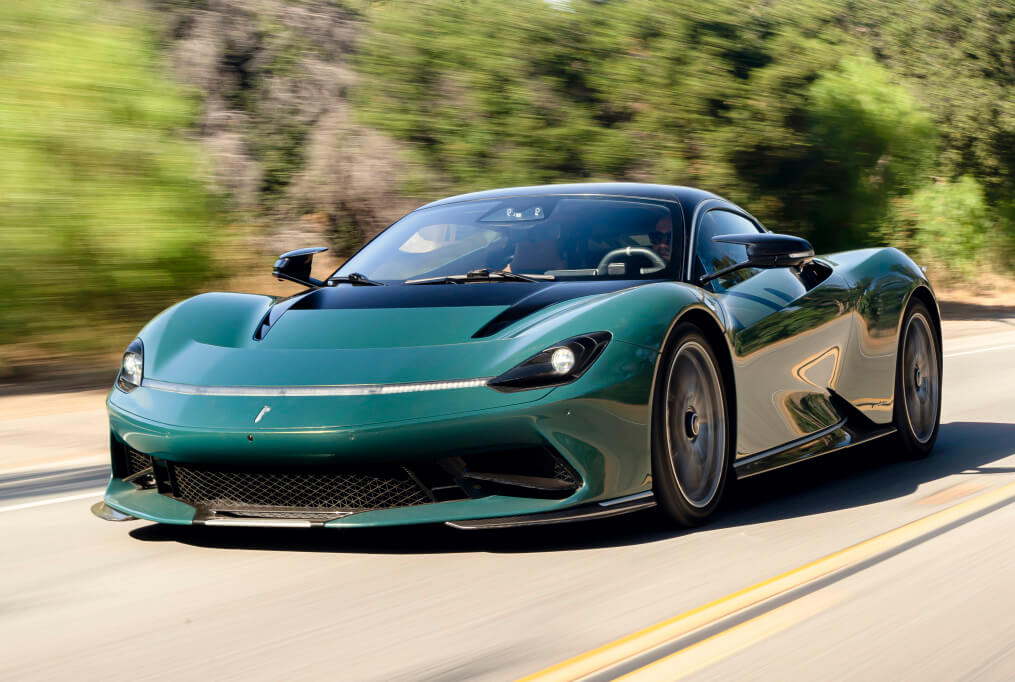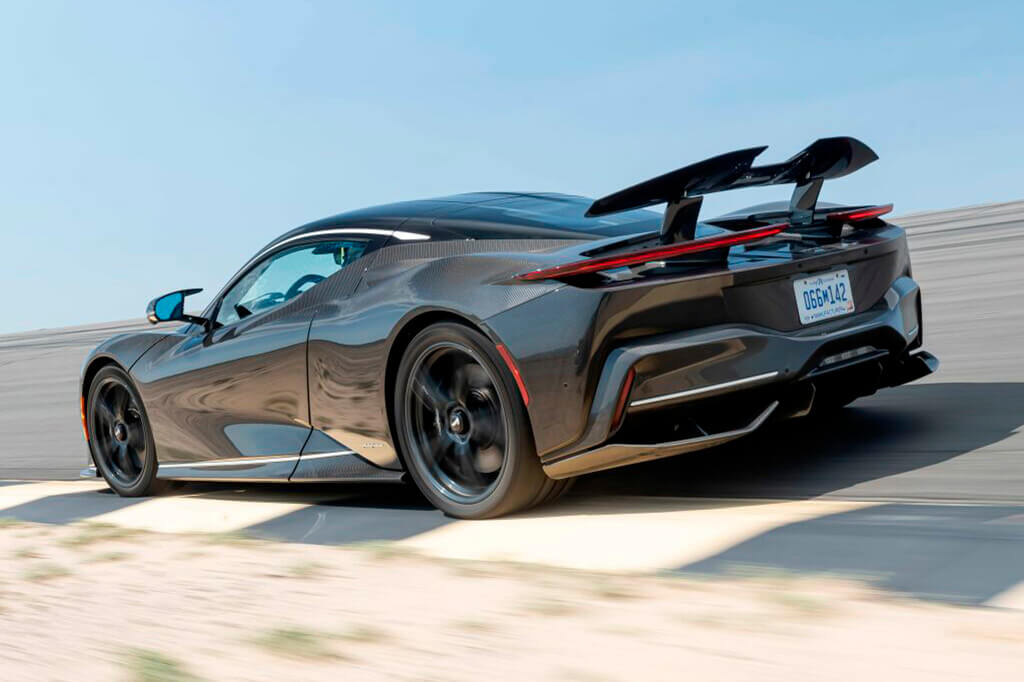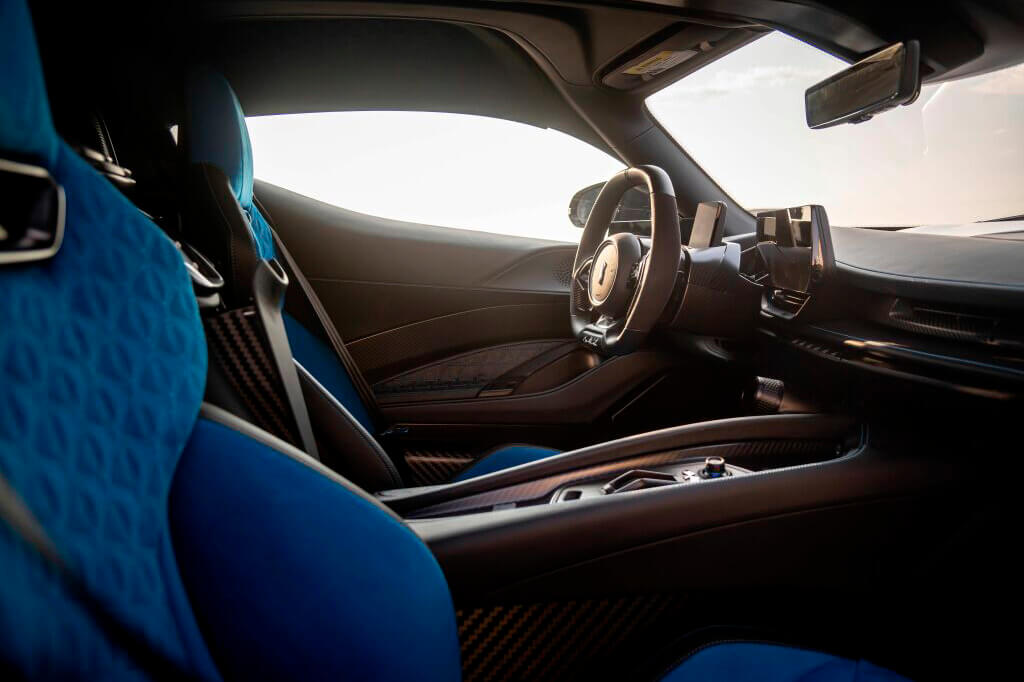Pininfarina Battista
| Predecessor: |
|---|
Description
The Pininfarina Battista is a 2-seater electric sports car with excellent driving performance, presented at the 2019 Pebble Beach Concours d'Elegance.
Development and production
In the form of a prototype, the Pininfarina Battista electric car debuted in the spring of 2019 at the Geneva Motor Show and became the first model of Automobili Pininfarina GmbH, a luxury electric car division of the Italian company of the same name, which has been owned by the Indian company Mahindra Group since 2015. Headquartered in Munich, Germany, Automobili Pininfarina is working with Bosch and Benteler to develop an electric modular platform for future new sedan and crossover products. Almost all the technical stuffing for Battista was supplied by the Croatian startup Rimac.
The planned circulation of Pininfarina Battista is 150 copies, including 5 copies of the Battista Anniversario presented in 2020. Cars were planned to be equally distributed among potential buyers from North America, Europe, Asia and the Middle East. Each car was assembled by hand at a specialized Pininfarina plant located in Cambiano (Italy). 40% of the planned cars were reserved before they even appeared.
Engine
There were no fundamental differences between the production version of the Pininfarina Battista and the prototypes shown earlier: the car was also based on a carbon fiber monocoque with an integrated 120 kWh battery supplied by Rimac, a full charge of which was enough for 476 km of the WLTP cycle (on the prototype 450 km of run was declared).
The battery had a complex T-shape and an advanced liquid cooling system with five radiators. The batteries themselves were not traditional lithium-ion, but lithium-nickel-manganese-cobalt-oxide (LiNiMnCoO2), the main advantages of which were a large potential capacity, low cost and high resistance to temperature changes. The electrical system operated at 800 volts, and the maximum power of the DC charger was 500 kW.
The car had four separate liquid-cooled permanent magnet synchronous motors, each mounted on a wheel with its own single-stage reduction gear, and their total power output was 1400 kW/1904 hp. and 2300 Nm of torque. For comparison: the similar model Rimac Nevera had 1914 hp. and 2360 Nm). Up to 100 kph Battista accelerated in 2 s, up to 300 kph in 10.5 s, the maximum speed was 349 kph (for Rimac Nevera – 412 kph).
The electric car had a recovery system, and, according to information from various sources, was equipped with the R-AWTV 2 (Rimac's All-Wheel Torque Vectoring 2) system, which not only allowed thrust vector control, but also replaced ABS and ESP, varying the load of each motor. There were seven driving modes to choose from.
Chassis
The car had a carbon fiber monocoque chassis with aluminum shock absorbers front and rear. Most of the body panels were also made from carbon fiber. The suspension of all wheels was double-lever with adaptive shock absorbers. Pirelli P Zero Corsa tires were 265/35 R20 front and 325/30 R21 rear.
Brake system
The Brembo braking system featured 390 mm carbon ceramic discs and 6-piston calipers at the front and 4-piston at the rear.
Exterior
The production model has undergone minor changes, including changes to the air intakes in the front of the car, exterior mirrors and bumpers. Three variants of the car were available. In the first version of the model, Grigio Luserna Battista, the body was made in matte blue tones, the wheels were beige. Called Iconica, the car had a dark blue finish and the transition from the windshield to the hood was modified with elements of carbon fiber reinforced plastic. The front wing was divided into two parts. The third model was painted in Bianco Sestriere. There was a red aluminum trim strip between the door and the sill, as well as red brake calipers.
Interior
The interior of the car could be customized according to the customer's specification. The steering wheel, a rectangular carbon fiber sports wheel, was flanked by two large screens on both sides, which displayed important data to the driver. The salon was covered with leather of different colors. The manufacturer claimed that the car generated the sound of movement using acoustics.
Sources
Specification
| Bodywork | |
|---|---|
| Presentation | |
| Years of production |
2021-
|
| Produced (pcs.) |
150
|
| Body type |
купе
|
| Number of doors |
2
|
| Number of places |
2
|
| Engine | |
|---|---|
| Engine type |
электрический (BEV)
|
| Number of electric motors |
4
|
| Cooling |
жидкостное
|
| Power output (hp / kW /) |
1904 /
1400 /
|
| Torque (N•m) |
2300
|
| Battery Type |
Li-ion
|
| Battery capacity (kWh) |
120
|
| Battery voltage (V) |
800
|
| Specific | |
|---|---|
| Specific output (hp/tonne) |
952,00
|
| Specific output (kg/hp) |
1,05
|
| Specific torque (N•m/tonne) |
1150,00
|
| Transmission | |
|---|---|
| Driven wheels |
полный
|
| Suspension | |
|---|---|
| Front suspension |
независимая на двойных поперечных рычагах
|
| Rear suspension |
независимая на двойных поперечных рычагах
|
| Elastic elements in front |
пружины
|
| Elastic elements in rear |
пружины
|
| Front anti-roll bar | |
| Rear anti-roll bar | |
| Tire brand |
Pirelli P-Zero Corsa
|
| Tyres front |
265/35 R20
|
| Tyres rear |
325/30 R21
|
| Steering | |
|---|---|
| Steering type |
шестерня-рейка
|
| Power steering |
да
|
| Brakes specs | |
|---|---|
| Brakes front |
дисковые вентилируемые
|
| Brakes rear |
дисковые вентилируемые
|
| Front brake diameter (mm) |
390
|
| Rear brake diameter (mm) |
380
|
| Disc material |
карбон-керамика
|
| Brand of brakes |
Brembo
|
| Number of caliper pistons (front/rear) |
6/4
|
| Anti-lock braking system |
да
|
| Dimensions and weight | |
|---|---|
| Body |
монокок с панелями
|
| Body material |
углеволокно
|
| Length (mm) |
4611
|
| Width (mm) |
1979
|
| Height (mm) |
1206
|
| Wheelbase (mm) |
2650
|
| Dry weight (kg) |
1610
|
| Curb weight (kg) |
2000
|
| Performance specs | |
|---|---|
| Range (WLTP) (km) |
476
|
| Dynamic specs | |
|---|---|
| Acceleration 0-100 kph (s) |
2,0
|
| Acceleration 0-200 kph (s) |
5,0
|
| Acceleration 0-300 kph (s) |
10,5
|
| Acceleration 0-60 mph (s) |
1,9
|
|---|---|
| Acceleration 0-100 mph (s) |
4,3
|
| Acceleration 0-402 m (1/4 mile) (s) /kph/ |
9,1 /
|
|---|
| Top speed (kph) |
349
|
|---|---|
| Top speed (mph) |
217
|
| Tags: | |
|---|---|
| Type: | |
| Brand: | |
| Country: |
- 114 views



